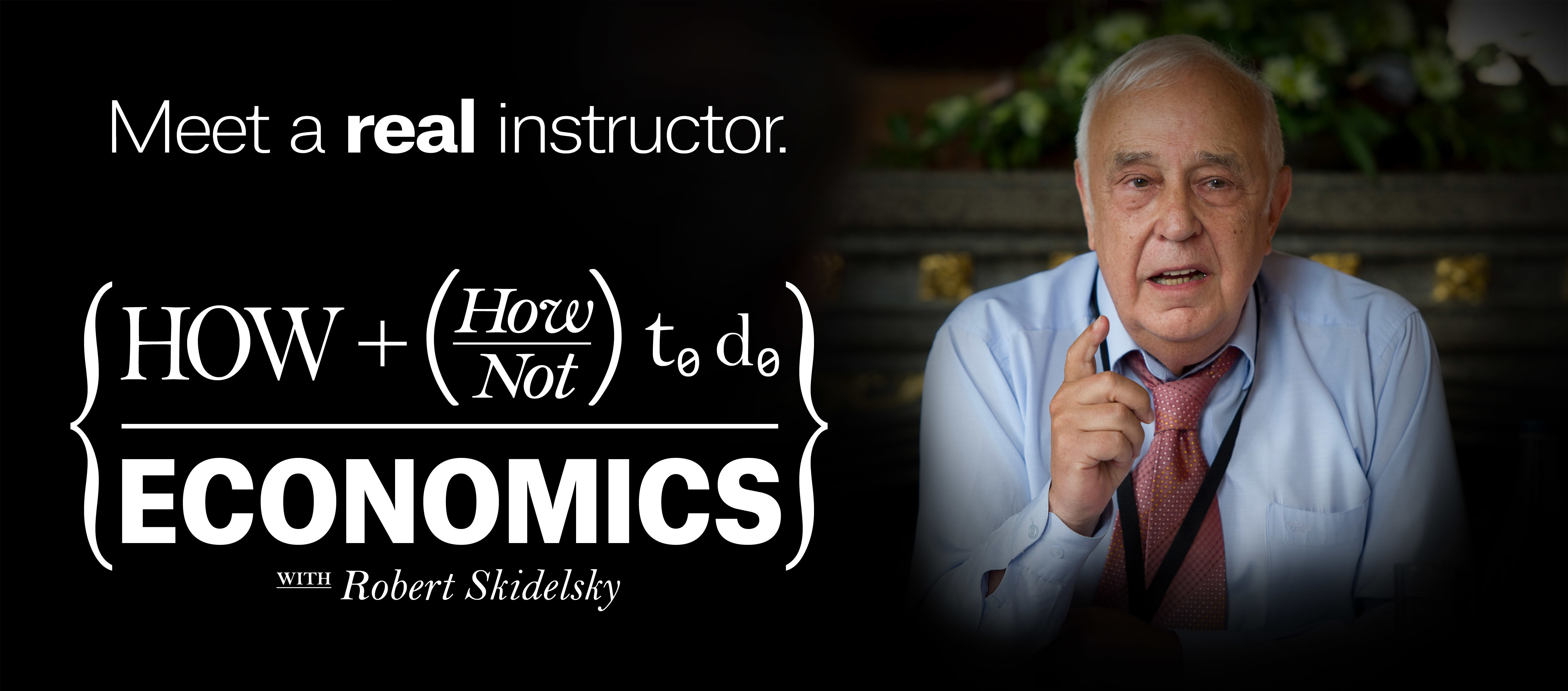
New INET lecture series. Expanding an understanding of economics beyond mathematical models, Robert Skidelsky covers topics essential to using economics to better understand the world, such as economics and history, the role of psychology and sociology in economics, and the role of methodology.
Lecture #1: What Is Economics About?
Why did economists largely fail to predict the 2008-09 financial crisis? In the first lecture in his INET series, “How & How NOT to Do Economics,” Robert Skidelsky looks at a neglected cause: methodology. The way economists build their models determines the answers they give to practical questions.
Lecture #2: Unlimited Wants, Limited Resources
Lionel Robbins defined economics as: “the science which studies behaviour as a relationship between unlimited wants and limited resources which have alternative uses.”
How do we understand this tension between unlimited wants and limited resources? That’s what Robert Skidelsky examines in this second lecture of his INET series, “How & How NOT to Do Economics.”
Lecture #3: Economic Growth
One of the central subjects of economics is wealth. But there is not just one narrative of economic growth, but a multitude. In this third lecture in the INET series “How & How NOT to Do Economics,” Robert Skidelsky looks at three stories of development: neoclassical, structuralist, and Marxist.
Lecture #4: Is Economics a Science?
Most economists think of economics as a science. But are they right? If so, what kind of science is it? You can put on the uniform of a policeman, but does that make you a policeman?
These, and more questions, are answered in this fourth lecture in INET’s “How & How NOT to Do Economics, with Robert Skidelsky.”
Lecture #5: Models and Laws
How do economists seek to establish their so-called laws? What is the scientific status of such laws? Are they always valid or merely useful rules-of-thumb?
These, and more questions, are answered in this fifth lecture in INET’s “How & How NOT to Do Economics, with Robert Skidelsky.”
Lecture #6: Psychology and Economics
To the non-economist the most striking fact about economics is the crudeness of its psychology. That’s because, for the economist, homo sapiens is homo economicus, or the human robot.
In this sixth lecture in INET’s “How & How NOT to Do Economics,” Robert Skidelsky looks at economics’ relationship with psychology.
Lecture #7: How Can Sociology Help Economics?
In economics the key behavioral idea is individual self-interest. In sociology it is the social “norm.” The first abstracts from society. The second presupposes it.
In this seventh lecture in INET’s “How & How NOT to Do Economics,” Robert Skidelsky looks at economics’ relationship with sociology.
Lecture #8: Economics and Power
Where—if anywhere—is power is located in economic life? How economists do deal with it? And to what extent is economics itself part of the power structure?
In this eighth lecture in INET’s “How & How NOT to Do Economics,” Robert Skidelsky looks at economics’ relationship with power.
Lecture #9: History of Economic Thought
The main reason for studying the history of economic thought—says Robert Skidelsky in this ninth lecture in INET’s “How & How NOT to Do Economics”—is to question the claim that economic knowledge is cumulative. Mainstream economics assumes that all useful economic knowledge from the past is incorporated in present theories. However, the substance and methods of economics have been interminably disputed ever since the start of the “science.”
Lecture #10: Economic History
In this tenth lecture in INET’s “How & How NOT to Do Economics,” Robert Skidelsky argues that there are two main reasons why economists should study history. The first is to make history better. The second is to make economics better. If history is the study of the particular, and economics of the general, the value of history to economics is to enable them to make their generalizations more concrete and admit their limits.
Lecture #11: Ethics and Economics
In 1983 University of Chicago economist George Stigler proclaimed “The economist doesn’t need ethics; only arithmetic. His task is to clear up social mistakes.” In this eleventh and final lecture in INET’s “How & How NOT to Do Economics,” Robert Skidelsky takes a different view of ethics’ place in economics
originally posted here
